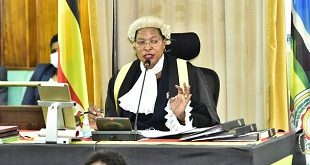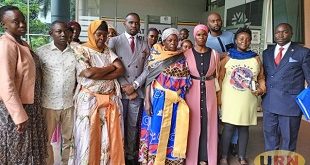
Air pollution in Kampala is projected to worsen if no deliberate interventions are implemented
Kampala, Uganda | THE INDEPENDENT | As the world commemorates Air Quality Awareness Week, Uganda on Tuesday called for joint action to address emissions that lead to detrimental health issues.
Experts told reporters that urgent action is needed to address air pollution in the east African country, especially in the capital Kampala where some parts register higher levels than those set by World Health Organization (WHO).
According to the 2021 World Air Quality Report, Kampala was ranked among the most polluted cities, with pollution levels exceeding WHO cut-offs by 5-7 times. The main sources of air pollution include dust from unpaved roads, domestic solid biomass energy use, and exhaust and non-exhaust emissions from vehicles, industrial emissions and open burning of solid waste.
Experts warned that with the ever-increasing urban population, air pollution in Kampala is projected to worsen if no deliberate interventions are implemented.
The warnings come at a time when the world is commemorating the 16th annual Air Quality Awareness Week (May 2-6), which aims at sharing information on air quality and how it affects health. This year’s celebrations are held under the theme, “Be Air Aware and Prepared”.
National Environment Management Authority (NEMA), a state-run environment watchdog, said it is working on new regulations and standards aimed at reducing emissions.
“These standards will regulate emissions generated from vehicles, workplaces, industries, fugitive emissions, indoor air quality and the general ambient air quality,” said Akankwasa Barirega, the executive director, NEMA.
Barirega said the regulations and standards will also form a basis for enforcement if one violates the set cut-offs.
To reduce on the emissions, KCCA said it will be tarmacking more city roads, increasing the number of signaled junctions and traffic management innovations to streamline city traffic control. The city will also promote and implement green mobility alternatives including electric mobility, non-motorized transportation and mass-transit alternatives.
The public, according to KCCA, also has a role to play in reducing air pollution. The authority said individuals can walk or cycle as a way of reducing the carbon footprint. Individuals can also among others use alternative transportation (bus or carpool) to get to work.
Engineer Bainomugisha, the AirQo Project Leader based at Makerere University, Uganda’s top university, said the project is continuing to deploy air quality monitors in different urban centers. Through a phone application, one can see the quality of air in space and time across the country.
He said authorities have also been trained on how to analyze, interpret and understand air quality data thereby taking informed policies and actions.
“With this information, authorities have the power to take mitigation actions to reduce air pollution,” Bainomugisha said.
He said the project has also been carrying out community outreaches teaching the public on the effects of pollution and how they can help protect the environment.
*****
Xinhua
 The Independent Uganda: You get the Truth we Pay the Price
The Independent Uganda: You get the Truth we Pay the Price



Kampala City divisions:
We are looking forward to the plan for residential areas where burning of hydtocarbons/ plastic waste is the order of the day
It ranges from burning car tyres to get wires for making charcoal stoves to impunity in the management of domesyic waste. It also gets spiced up with some factory emission
During lock down the air became better but this did not stop some of us from suffering asthmatic attacks whenever the neighbour set the waste on fire
We see the vehicles responsible for waste collection.in.the same villages
We look forward to the sensitisation
At the end of a morning programme the Lord Mayor told us of some plans to do with air Quality
“Each individual has a role to play”
We continue to wait at village level;
So we categorise waste; solid, gaseous and liquid
Each of these has issues to do with causing harm to humans:
(a) Liquid irrespective of source flows freely into the neighbourhood*
(b) gaseous noxious gases should not be among human dwellings**
(c) Solid:- should be segregated by the one who generates it as plastic, glass, Medicine, electrobic, chemical and biodegradable; BUT some clinics currently dumping/ include their waste into general waste, there is home based management of ailments, so there is medical waste*** as well; each of these requires a receptacle labelled for the purpose.
So the waste collecting unit will provide these receptacles? (hopefully)
Having separated this waste from source, it is assumed the respective destination has been worked out
This village plan is based on the assumption. that the LORD MAYOR’S facilitation (he mentioned on TV) will meet the expenses
The system works in some urban councils else where
* and *** should be a yardstick for effective leadership at village level
A nice dream for an aging citi,en